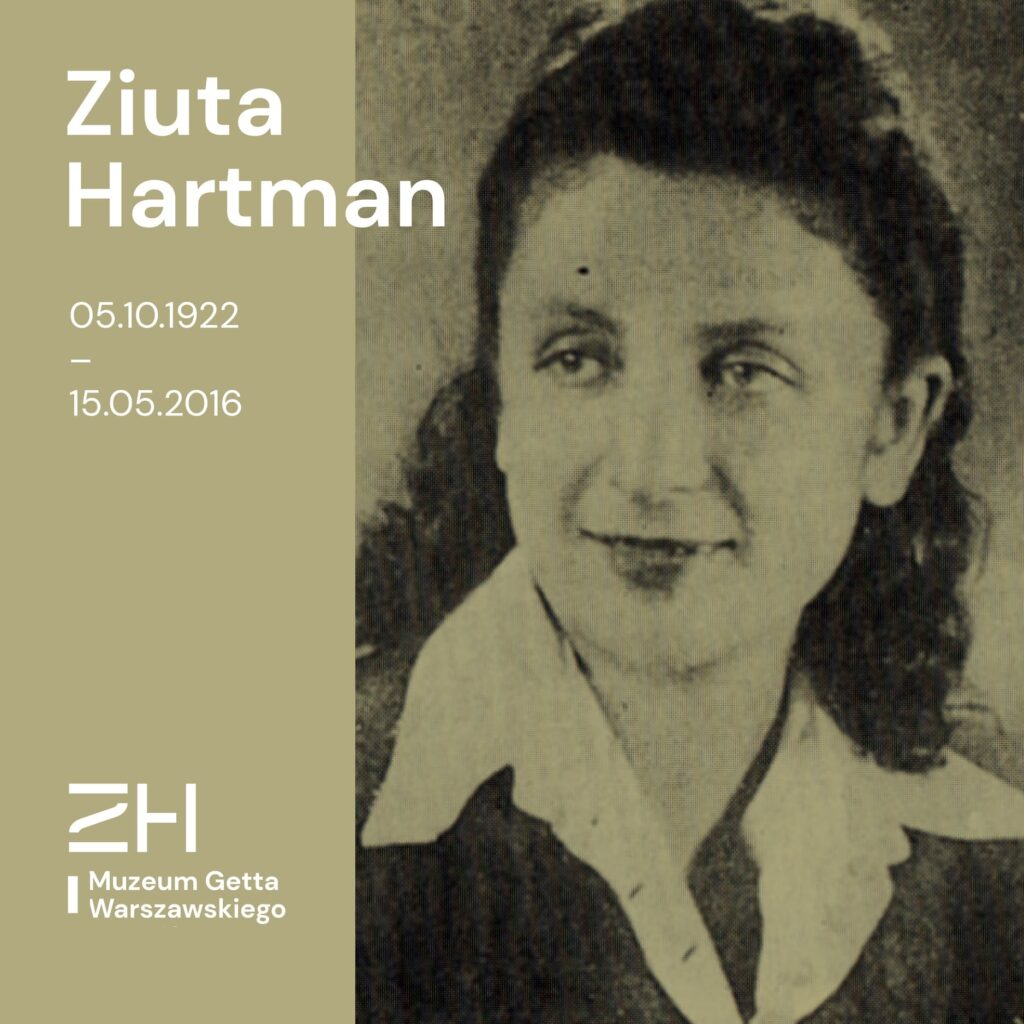Ziuta Hartman (5.10.1922–19.05.2015)
member of the Jewish Military Union, hero of the Warsaw Ghetto Uprising

Ziuta Hartman was born on October 5, 1922 as Igetle Rottenberg, daughter of Juda Rottenberg and Bella Ajzenberg. She came from a wealthy Jewish family from Kielce: her father ran his own business, her mother did not work, and the family had a chauffeur and a babysitter who used to call the girl ‘Ziuta’ – this name stayed with her forever. The parents endeavored to follow traditions and maintain Jewish customs, such as celebrating the Sabbath or going to synagogue, but they were not overly religious, and the father’s interests sometimes made it difficult to follow all the commandments and prohibitions of Judaism. Polish was spoken at home – Yiddish was used only sporadically, and that only because of Ziuta’s grandfather. As she herself admitted, she felt more Polish than Jewish. At the age of three she was enrolled in a Jewish kindergarten and then in the Jewish General School. Her parents tried unsuccessfully to transfer her to a Polish school, but the anti-Semitism she encountered there forced them to withdraw their decision. Ziuta attended the Jewish Gymnasium for Girls, but the outbreak of World War II prevented her from taking her final exams.
Her older brother had emigrated to Palestine before the war, while her father ended up in the Soviet Union after the war broke out. In 1941, Ziuta and her mother were ordered to move to the ghetto established in Kielce – their apartment at 20 Młynarska Street (now Mielczarskiego Street) was outside its boundaries. They lived in her grandfather’s house. Because of her fluency in Polish and her “good” looks, Ziuta often went to the so-called Aryan side to get food for her family. During one such trip, a Pole (probably her father’s former employee) denounced her to the Gestapo for not wearing an armband with the Star of David. As a result, she fled to the Radom ghetto and from there to relatives in Warsaw.
At first she hid after on the so-called Aryan Side, but at the beginning of 1942 she entered the ghetto through the underground passage under Leszno Street, where she began to work in Toebbens’ shed. During the so-called Great Liquidation Actionin in the Warsaw Ghetto, Ziuta met an old friend from Kielce at the beginning of 1942 Abraham Rodal, the brother of Leon Rodal, one of the commanders of the Jewish Military Union (ŻZW). She was recruited as a liaison officer for the ŻZW; she smuggled food, medicine, correspondence and weapons into the ghetto. During the Warsaw Ghetto Uprising, she took part in the fighting and cared for the wounded in the bunker at Świętojerska Street. After the Germans took the hiding place, she found herself at the Umschlagplatz, from where she experienced a real ordeal: from the labor camp in Poniatowa and the concentration camp in Majdanek, to the forced labor camp in the HASAG factory in Skarżysko-Kamienna, to the Buchenwald subcamp KL in the arms factory in Leipzig, where she witnessed the liberation.
After the end of war, she returned to Kielce to learn that her father had died in 1943 in USSR and the rest of the family in the Treblinka death camp. She worked on the local Jewish committee. Her future husband, Mosze Hartman, whom she had met in one of the camps, joined her there. Together they emigrated to France, from where they moved to Israel in 1952. They had two sons. Ziuta Hartman was a co-organizer of reunions of former death camps prisoners. She guarded the memory of the fighters of the Warsaw Ghetto and her comrades-in-arms from the Jewish Military Union. She appeared in the documentaries “Planty 7/9” by Michał Jaskulski and “Uprising in the Warsaw Ghetto at the beginning of 1942 the Untold Story” by Yuval Haimovich-Zuser. On the Day of Remembrance of the Martyrs and Heroes of the Holocaust in 2008, the 60th anniversary of the establishment of the State of Israel, she was honored by lighting a lantern in honor of the ghetto fighters. In 2010, the City Council awarded Ziucie Hartman the title of Honorary Citizen of Warsaw. She accepted the award but did not attend the ceremony because after the war she promised “never to return to that cursed place.” She died on May 19, 2015, at the age of 93.
